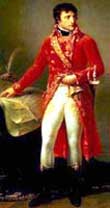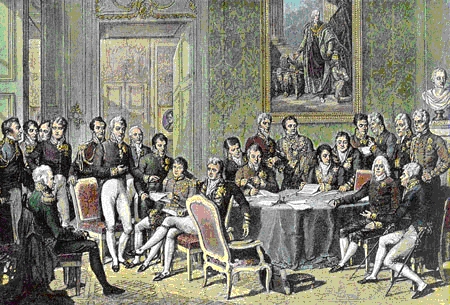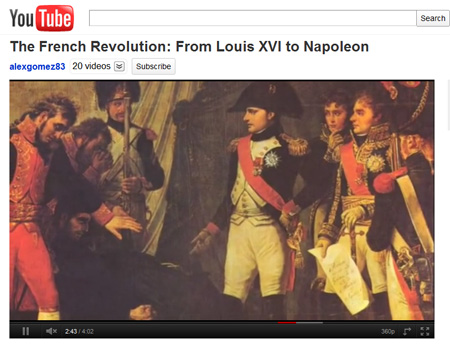 Napoleon Bonaparte. Source: www.historywiz.com
Napoleon Bonaparte. Source: www.historywiz.com
A new absolute ruler
After the fall of Robespierre in 1794, a new group of people took over the government. They were called the Directory. There were five Directors with a great deal of power, but they were very corrupt. There was still a lot of dissatisfaction in France as ordinary people did not have the vote, France was still at war and the economic problems continued.
During the 1790s a man called Napoleon Bonaparte rapidly in the ranks of the French army and his victories over France’s enemies soon made him a popular hero. In 1799, Napoleon joined a plot to overthrow the Directors and to set up a new and stronger government. Napoleon took control of the government in a coup d’etat or military takeover. He now had the power to make laws, appoint government ministers and declare war. He ruled as a director from 1799 to 1815. Napoleon was not king, but his power was absolute, almost in the same way as that of King Louis XVI.
Nationalism and war
Under Napoleon, France become a strong empire. He waged many wars of expansion against neighbouring countries and so expanded the size of France. He enjoyed victories against mighty states like Austria, Prussia and Russia, and by 1810 controlled much of Europe. In some of the states he conquered, he placed relatives on the throne ensuring loyalty to him. He also introduced his system of administration to these countries. Careers became based on talent and merit rather than class (like under the Old Order). There was freedom of religion and secular education. All of this went against the Old Order, and so the revolutionary values that were introduced by the French Revolution spread all over Europe. So although Napoleon brought an end to the Revolution and became a despot, he was still influenced by the Revolution’s ideals. Through his conquests, he became responsible for the spread of these ideals throughout the continent.
The other European nations did not want to be under France’s rule. Napoleon was seen as a liberator to many ordinary people, but his motivation remained French expansion of power. He was a mighty ruler, but not without weakness.
For the first time, french soldiers fought for their country rather than fighting as subjects of the King of France against other king’s subjects. Every Frenchman was encouraged to become a soldier. This made the French armies stronger than professional armies of their enemies.
There was a new sense of national unity. Nationalism encourages people from a particular country to think that their country is the best and to show that it is the strongest. Nationalism became a very important force in world history in the nineteenth and twentieth centuries. Before Napoleon came to power, he helped the Directory crush international rebellion. He ordered his troops to use cannon fire on a group of citizens who were rebelling against the government. Napoleon later justified his apparently vicious tactics as a humanitarian action.
Napoleon had an astonishing memory of places, the numbers of his regiments, the baggage battalions. He knew where each one was, when it started, when it should arrive at its destination, He was famously caring about his troops and once remarked that “an army marches on its stomach”, so he always made sure that his soldiers had sufficient quantities of healthy food.
Napoleon, the benevolent despot
Napoleon Bonaparte became Emperor of France in 1804.Napoleon restored France to autocracy. He was a despot who suppressed freedom of the press and other freedoms but he did not do away with all the principles and policies of the Revolution. For example, under his rule all people were equal before the law. He is therefore described as an “benevolent despot,” This means that he ruler France in an autocratic (not democratic) way, but reformed and improved many of the laws to the benefit of ordinary people.
In the next eight years, the French army under Napoleon gained control of most of Europe, with notable exception of Britain and Russia.
Napoleon’s reforms
The Declaration of the Rights of Man was never written into a single code of national laws. In 1804 Napoleon introduced a single clear set of laws for the whole nation of France called the Code Napoleon. This consisted of five codes that laid down rights and duties of every Frenchman. Some features of these codes were:
- All feudal rights and privileges were ended
- People were declared equal before the law
- Trial by jury was guaranteed
- Religious freedom was introduced
- Civil marriage and divorce were permitted
- The family (not the individual) was the basic unit of society
- Husbands had absolute power over their wives and could even send their children to prison for one month.
State-funded secondary schools or lycees were set up so that promising boys could receive scholarships. Subjects such as science and mathematics and military training were emphasized. Discipline and loyalty to France were encouraged. Teachers had to take an oath of loyalty to France.
In 1801 Napoleon signed an agreement with the Pope which made Catholicism the official religion of France. However, people were allowed to practice other religions. Napoleon controlled the economy of France. The Bank of France was created and taxes were efficiently collected. New roads, bridges, canals and buildings were built. Napoleon spent a lot of money making Paris into a beautiful city. His improvements included monuments, pavements, art galleries, gas lighting and clean water. Napoleon rewarded talented, hard-working men by instituting the Legion of Honour in 1802. This was a medal, which came with a small pension that was awarded for services to politics, administration, art, music and literature.
We should not forget, however, that Napoleon was a dictator. There was no freedom of speech. Detention without trial was revived in 1810. The press was heavily censored and used for propaganda. A secret police force was active. No opposition to Napoleon was tolerated. All officials in central and local government were appointed by Napoleon and wee responsible to him. There was a strict supervision to prevent corruption.
 The Congress of Vienna. The Marquis of Labrador is seated at the round table, third from the right of the diplomats who are seated. Source: Wikipedia.
The Congress of Vienna. The Marquis of Labrador is seated at the round table, third from the right of the diplomats who are seated. Source: Wikipedia.
Napoleon’s defeat and the Congress of Vienna
Napoleon’s decline began in 1812. He invaded Russia and his armies were heavily defeated. In March 1814 Napoleon was defeated by the combined forces of Britain, Holland, Austria, Sweden and Prussia. He was forced to give up his position as Emperor of France and was exiled to the small island of Elba, off the coast of Italy. However, in 1815, he escaped, returned to France and attempted to regain his power. His rule lasted for one hundred days. The combined forces of Britain, Austria, Prussia and Russia defeated him at the Battle of Waterloo on 15 July 1815. This time he was exiled to St Helena, an island in the Atlantic Ocean.
After Napoleon was defeated, statesman from major countries of Europe met in Vienna (Austria) for a congress in 1815. The decisions made at this conference profoundly affected the history of Europe. The delegates attempted to “put back the clock”, to change this back to the way they had been in France and Europe before 1789. This reactionary or conservative view did not take into account all the changes that had been brought about by the French Revolution and the conquests of Napoleon.
What problems did the Congress of Vienna face?
- The old order had been seriously weakened in most of western and central Europe. Many rulers had been dethroned. They had to decide whether or not to restore them to their thrones.
- Many of the people of Europe were in favour of keeping the changes brought by the ideas and principals of the French Revolution and Napoleonic rule. The rulers of Europe were opposed to the ideas of liberalism and nationalism and wanted them stamped out.
- The rulers of Europe wanted to restore peace and order to Europe after twenty years of fighting. They did not want the situation to arise again were one nation could become so powerful that it disrupted to peace of Europe.
What did the Congress of Vienna decide to do?
The decision-makers at the Congress of Vienna were powerful leaders who represented the conservative monarchs of Europe, not the people. They decided the following:
- Deposed rulers would be returned to their thrones. Louis XVI’s brother was put on the French throne to rule as Louis XVIII.
- Strict measures were agreed on to stamp out revolutionary ideas. The system of absolute monarchy was reinstated and the idea of “liberty and “fraternity” was stamped out. His did not stop people believing in it, however.
- They believed that they could best keep peace by not allowing any of the large states to become too powerful.
Activity If you have a computer at home or at school, download the youtube video titled ‘The French Revolution: From Louis XVI to Napoleon’. Watch the video and discuss it in class. The back track to the video is a cold play song. Watch the video again and listen to the lyrics. Have a class debate on whether or not you think the band wrote the song about the French Revolution. 
Screenshot of the youtube video titled ‘The French Revolution: From Louis XVI to Napoleon’
Case study: the spread of revolutionary aspiration The ideas of the revolution spread to French colonies, this section will outline the case of Saint- Dominque. This section is currently under construction. If you have any lesson suggestions or content please send it to us using the ‘contribute’ button.